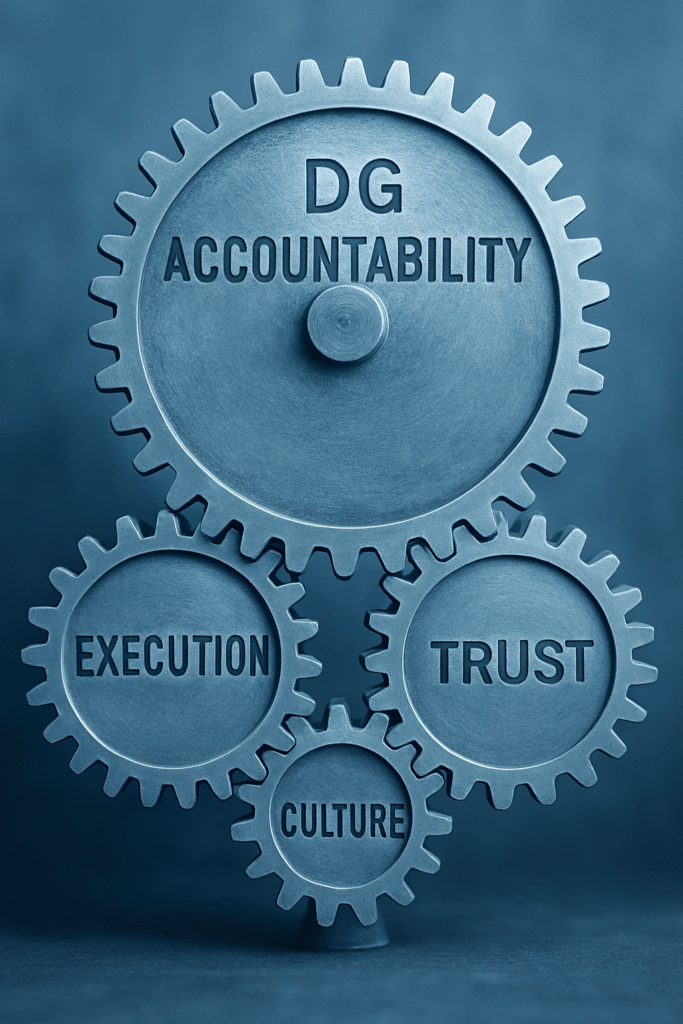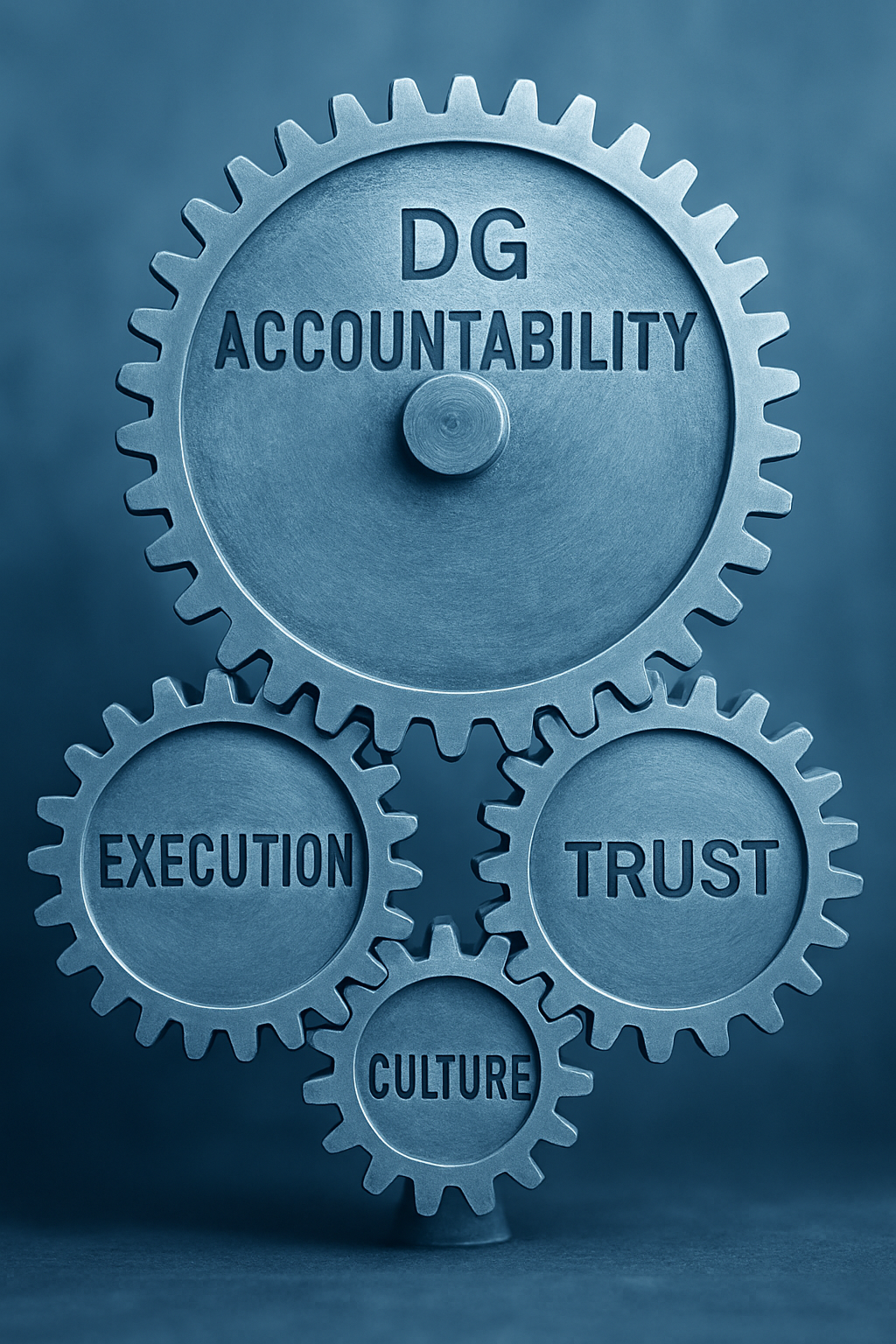DGs as the Execution Core
For Directors General (DGs), accountability is not an abstract principle—it is the daily reality of managing programs, people, and resources. Positioned as the operational backbone of government, DGs turn strategy into delivery. In times of transformation, DG accountability takes on heightened importance.
Deputies and ADMs rely on DGs to deliver measurable outcomes. Citizens, stakeholders, and central agencies expect transparency, fairness, and value. Yet DGs must achieve these outcomes while navigating complex governance structures, shifting political priorities, and finite resources.

This makes accountability not just a reporting function but a leadership imperative. DGs who embrace accountability foster trust upward, empower their teams downward, and ensure transformation succeeds.
The DG’s Unique Accountability Role
DGs are often described as “the engine room of government.” They oversee large teams, administer significant budgets, and ensure compliance with legislation, Treasury Board requirements, and ministerial mandates.
Three dimensions define DG accountability in transformation:
- Program Integrity – ensuring policies are executed as designed, within legislative and fiscal frameworks.
- Operational Excellence – balancing efficiency with effectiveness in service delivery.
- Cultural Leadership – modeling accountability behaviors that cascade through management layers.
Accountability at the DG level ensures that transformation is not merely a plan but a lived reality.
The Stakes of Accountability for DGs
Unlike Deputies or ADMs, DGs live closer to the ground realities of service delivery. This proximity creates pressure: frontline employees and stakeholders look to DGs for answers.
When accountability is strong:
- Performance is measurable, visible, and credible.
- Deputies and ADMs trust DGs to handle complexity without excessive oversight.
- Staff feel secure that their work contributes meaningfully to organizational goals.
When accountability is weak:
- Transformation falters due to misalignment, duplication, or resource waste.
- Deputies lose confidence and begin to micromanage.
- Staff disengage, fostering a culture of risk aversion.
Public administration research consistently highlights accountability as the cornerstone of effective governance. Without it, even the best-designed reforms risk failure (Bovens, 2007; Dubnick, 2014).
Accountability Beyond Compliance
Too often, accountability in government is conflated with compliance. While compliance with rules, audits, and reporting frameworks is critical, accountability extends further.
DG accountability involves:
- Answerability – being prepared to explain and justify decisions.
- Responsibility – owning both successes and failures.
- Transparency – creating visibility into how and why decisions were made.
- Learning – adapting based on feedback and performance data.
As Bovens (2007) argues, accountability in the public sector should be understood as a relationship of trust, not just a checklist of compliance requirements.
The Transformation Challenge: Accountability Under Pressure
Transformation places extraordinary demands on DGs. Programs must adapt rapidly, digital tools are deployed, and new delivery models are tested.
Accountability stress emerges when:
- Priorities shift rapidly due to political direction.
- Resource constraints limit what can be delivered.
- Multiple stakeholders impose overlapping demands (central agencies, oversight bodies, unions, citizens).
These pressures increase the temptation to “manage upward” by spinning progress or “manage downward” by shifting blame. But this undermines credibility. DGs who maintain integrity in accountability, even when progress is uneven, earn long-term trust from Deputies and ADMs.
Strategies for Strengthening DG Accountability
DGs who thrive in transformation adopt practical strategies:
- Create a Culture of Transparency
Establish systems where progress, risks, and trade-offs are visible. Weekly performance dashboards, open data practices, and clear reporting mechanisms signal integrity. - Frame Trade-offs Honestly
Rather than reporting “everything is fine,” DGs strengthen trust by acknowledging constraints and presenting informed options. Deputies prefer clarity over false assurance (Aucoin, 2012). - Empower Middle Managers
Accountability cascades downward. By equipping Directors and managers with responsibility and tools, DGs build an “accountability chain” that reaches the front lines. - Balance Rules with Outcomes
Compliance is necessary, but transformation demands outcome orientation. DGs who focus accountability on citizen impact and service value foster innovation within safe boundaries (OECD, 2020). - Model Learning Behavior
Accountability includes admitting mistakes and applying lessons. Leaders who normalize learning, rather than punishing failure, create resilient organizations (Denhardt & Denhardt, 2015).
Case Example: DG Leadership in Digital Transformation
In a federal digital service renewal project, a DG faced significant delivery delays due to vendor performance issues. Instead of downplaying the risks, the DG escalated transparently to the ADM, while simultaneously engaging staff to find workarounds.
This integrity in accountability paid dividends:
- Deputies trusted the reporting and provided additional resources.
- ADMs shielded the DG from political backlash, knowing the issue was owned.
- Staff morale improved, seeing their DG model honesty and commitment.
The result: although delayed, the project ultimately delivered improved services, and lessons learned informed future initiatives.
The Cultural Dimension of DG Accountability
DGs are cultural carriers. Their leadership style directly influences how accountability is perceived throughout their organizations.
If DGs deflect responsibility or punish staff for setbacks, fear and avoidance dominate. If DGs model accountability—owning challenges, sharing credit, and learning from mistakes—the culture shifts toward resilience and trust.
As Denhardt & Denhardt (2015) note, public service leadership is most effective when leaders foster “shared responsibility” rather than top-down control. DGs who live accountability embed it in organizational DNA.
Independent Support for DGs
DGs often benefit from external advisory or coaching to navigate accountability in transformation. Independent support can provide:
- Frameworks for performance management that balance compliance and outcomes.
- Coaching in communication to strengthen upward reporting and downward trust.
- Neutral facilitation to help DGs balance multiple stakeholder demands.
Such support enables DGs to act with greater confidence, ensuring accountability strengthens transformation rather than becoming an obstacle.
Conclusion: DG Accountability as the Foundation of Execution
DGs stand at the fulcrum of government transformation. Their accountability ensures that strategy becomes delivery, that resources translate into results, and that public trust is preserved.
By embracing transparency, framing trade-offs honestly, empowering managers, and modeling learning, DGs create organizations where accountability is not feared but embraced.
Transformation succeeds when DGs drive execution with integrity—because at the heart of government performance, accountability is the foundation.
What’s Next?
Institute X supports DGs in building accountability frameworks, strengthening upward trust, and leading execution with integrity during transformation initiatives.
References
- Aucoin, P. (2012). New Political Governance in Westminster Systems. Public Policy Forum.
- Bovens, M. (2007). “Analyzing and Assessing Accountability: A Conceptual Framework.” European Law Journal, 13(4), 447–468.
- Denhardt, J. V., & Denhardt, R. B. (2015). The New Public Service: Serving, Not Steering. Routledge.
- Dubnick, M. (2014). “Accountability as a Cultural Keyword.” In Bovens, Goodin, & Schillemans (Eds.), The Oxford Handbook of Public Accountability. Oxford University Press.
- OECD (2020). Leadership for a High-Performing Civil Service. OECD Publishing.

